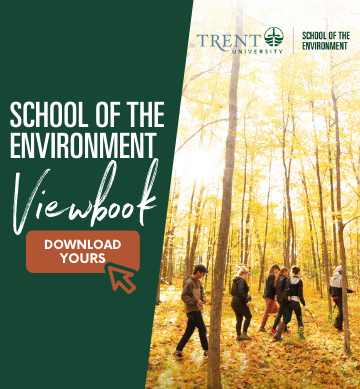TSE Showcase
Kim Bergeron, PhD
Professor | Geography Program | Trent University Alum ‘91

Kim Bergeron is a Professor in the Trent School of the Environment Geography Program and a Trent University Alum ’91. Kim has been teaching at Trent since 2014. She holds 12 years of experience teaching undergraduate and graduate level students both online and in the classroom in a variety of subjects including environment, health, nursing, education and social service.
Courses
-
GEOG 2310H Geography of Recreation
-
GEOG-ERST 2330H Changing Resources in the Circumpolar North
-
GEOG-NURS 3820H Health Geography
Research & Teaching Interests
Kim’s research focuses on planning age-friendly communities, and understanding government practices and policies related to managing spaces and places and how these management practices impact health of populations, particularly for those who are considered vulnerable populations (e.g., older adults, those with disabilities and/or on low-income and those living in rural, remote or northern communities). Aligning with her research, her teaching interests include facilitating students to consider a social justice lens to understand how the quantity and quality of resources (e.g., programs, food, transportation, recreation) made available can have a positive or negative impact on different populations based on their geographic, and socio-economic location.
What are you most excited for your students to learn or experience in your course(s)?
Kim is most excited to teach students how to use an equity lens to understand the human-environment relationship. This includes considering the health of humans and the environment to identify ways to protect both. In both her courses, students experience how to use objective audit tools to audit parks and/or neighbourhoods and use the results to make recommendations to increase the health of both the environment and humans. Students also learn a lot about how ‘form follows function’ (the idea that function of the space/place needs to be identified before the form of how it is to be designed). They also learn that where a person lives matters.
Highlights of Teaching in Trent School of the Environment
-
Students come to class ready to engage in interactive discussions.
-
Students find value in what is being taught and can apply the concepts beyond the course to their present and future lives. After graduation, students have shared how they have used concepts learned in class in their careers and how helpful it was to have this knowledge.
-
Students share they now know the value of voting in government elections as they understand how governments set policies and how these policies may not be beneficial to all populations and/or the environment.
Benefits of Learning at Trent School of the Environment
-
Students have the benefit to learn from incredibly enthusiastic professors passionate about their particular field of study and research. TSE faculty and instructors provide students the opportunity to engage in discussions and topics versus just being told information.
-
The local landscape and geographic location of Trent University is a great benefit to students by providing unique learning opportunities. Many courses include field trips for hands-on learning opportunities so students can get out of the classroom and experience the land and resources first-hand.
Advice for Trent School of the Environment Students
Be open-minded; consider impacts from the view of many perspectives and not just your own. Understand who and what is positively and negatively affected and work to mitigate the negative affects before they happen. TSE students act as ambassadors for both people and the environment.

Photo: Students in Kim Bergeron's GEOG-2310H Geography of Recreation course completing an audit of Jackson Park in Peterborough




